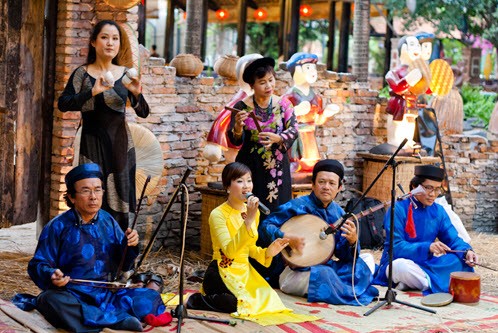(VOVworld) – The Ministry of Culture, Sports and Tourism has submitted the dossier of Don ca tai tu or amateur singing to UNESCO for recognition of the art as an intangible cultural heritage of humanity. The cultural sector, artists and community have continually preserved and developed this art form over the years.
 |
Don ca tai tu developed mainly in southern Vietnam. It is based on ritual music, which flourished in the 17th century, blending the traditional music of northern and central provinces while expressing the broadminded characteristics of southerners. Many domestic and foreign researchers have studied and systematized melodies of Don ca tai tu. It is considered one of the art forms that create diversity in Vietnamese culture. Vietnam’s submission of its dossier to UNESCO is a way to honor the value of this art through the promotion of the images of southern provinces and Vietnam to international friends. Nguyen Van Tan, former director of the representative office of the Ministry of Culture, Sports and Tourism in Ho Chi Minh city says: “UNESCO’s recognition of Don Ca Tai Tu as an intangible cultural heritage will help to promote its uniqueness and preserve the art’s traditional values, contributing to socio-economic development, particularly in culture and tourism.”
 |
From now until November, the Ministry of Culture, Sports and Tourism will step up activities promoting Don ca tai tu to Vietnamese people both at home and abroad. This is also one of Vietnam’s commitments attached to the dossier it submitted to UNESCO. Vu Kim Anh, Deputy Director of the Ho Chi Minh city Department of Culture, Sports and Tourism says: “Through a number of activities including surveys and seminars, we have collected enough statistics about Don ca tai tu in the city. We have printed 1000 books, 500 CDs and a collection of 1,000 songs. We have proposed to the municipal people’s commitment a special policy for folk artists.”
There are more than 2,000 clubs with tens of thousands of members of Don ca tai tu in 14 of the 21 provinces and cities that have this art form. Researchers and artists are trying their best with specific action programs to further develop Don ca tai tu. Doctor Mai My Duyen was among those who were involved in the survey process to compile the dossier of Don ca tai tu, She says: “We need to encourage people to engage in improvisation, which requires the participation of local administration and the culture, sports and tourism sector.”
In December UNESCO will announce the list of intangible cultural heritage items of humanity of this year. If Don ca tai tu is recognized, Vietnam will have 8 intangible cultural heritage items.